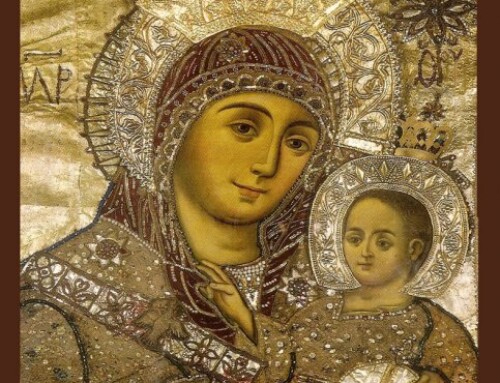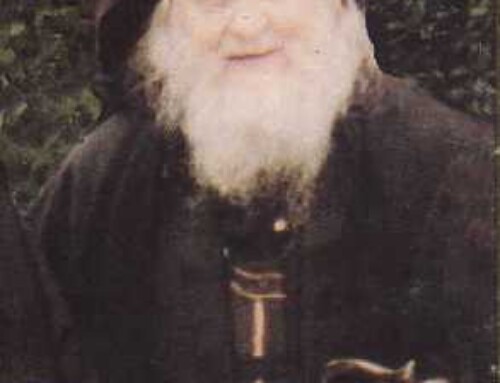Word Magazine April 1963 Page 9
“…FOR THE SICK AND THE SUFFERING…”
By Rev. Fr. Theodore E. Ziton
Pastor, St. George Eastern Orthodox Church, Vicksburg, Miss.
Reading the title of this article rather quickly might remind a member of our Holy Eastern Orthodox Church of a petition from the Great Ektenia of the Divine Liturgy of St. John Chrysostom or by St. Basil the Great. It is partially meant to lend itself to this avenue of thought, but more so it is directed to the sick and the suffering of our Faith or to any individual who might benefit from reading it.
Over the past few years I have come to realize certain basic truths. One truth concerns itself with the people who are sick and who are suffering from this illness, but who sometimes suffer more from fear and worry than from the malady with which they are afflicted. It is to these people who fear seeing a physician or a medical specialist about their sickness and who suffer more from the worry of a hospital convalescence that could cure them than from the suffering from heartache and worry which tends to lengthen their illness and which brings about complications that sometimes become incurable, because the factor of time — the proper time when a medical consultant was not thoroughly or sincerely thought out, investigated or applied for.
I am able to write these facts from experience gained while serving my last pastorate. It seems that human nature is very much the same regardless of the city. Thus, this article could be found in any journal, newspaper or what have you to help people better understand what is really available to them when sickness or suffering presents itself. One is sick, worried or perhaps lonesome! Courage must be sought after and one must sincerely realize that the most skillfully trained surgeons and physicians that our schools and our country could produce are enlisted to help one who is sick. One must realize that nothing will be spared to bring about a speedy recovery when one is in the care of the hospital. Efficient and cheerful medical aid will be given to one who enters “The Halls of Mercy,” and one should never fear or worry about the thorough care one can expect rather than to decide to “put off” or “let time take care of it” attitude.
An individual must realize that recovery is always dependent upon that individual. Doctors, nurses and medicine can do much, but they cannot do everything. Therefore, upon thoughtfully and truthfully deciding to enter a hospital an individual must realize that he or she must cooperate with the medical staff and minutely follow any instructions given. They are and were prescribed for an individual’s benefit and hedging about taking medicine or following a diet or following a prescribed physical routine is as disadvantageous to an individual as not entering the hospital as a patient, or entering and not finding a cure after twenty-four hours.
To worry, to complain, to grumble about one’s condition is not a healthy outlook toward recovery. One’s mental outlook affects one’s physical recovery. Be cheerful and be confident “that all things work together for good, to them that love God.”
An important lesson to learn is to use one’s leisure time for self improvement while convalescing. Enrolling for some correspondence courses, reading the fine books in the hospital library, and helping and praying for those less fortunate than oneself are ways that will aid in “passing the time.”
In concluding this article we must face up to the power of our religion, and no doubt, we will never be brought closer to our God or our Church, or our priest, than when illness and convalescence come. This “trinitarian” realization will convince one that one’s spiritual self is the true force behind one’s physical being.
St. James advises us in his Epistle:
“Is any sick amongst you? Let him call for the Elders of the Church, and let them pray over him, anointing him with oil in the name of our Lord, and the prayer of faith shall raise him up: and if he has committed sins they shall be forgiven him.” (James 5: 14-l5) The Apostles and Disciples, directed by Christ Himself, preached the Gospel, and they “anointed with oil many that were sick and healed them.” (Mark 6:13). The priest follows this tradition of the Apostles and Disciples when such as he has of the grace and the power of God does he give to those who believe in God through him. Thus, through faith, they are able to “rise up and walk.” This anointing of a sick person with blessed oil invoking God’s grace upon him is the Sacrament of Holy Unction which is not reserved for the state of those who are dying, but moreso, for those who are of the sick and the suffering.
Most holy of all the Sacraments of which we must and should avail ourselves is that of Holy Communion. “The Son of God became the Son of man so that the Son of man could again become the Son of God.” The aim of man’s life is union with God; to become one with God. Union with God is the fulfillment with the Kingdom, announced by the Gospels. This union with God is sought through Holy Communion. The believer partakes, under the appearance of consecrated bread and wine, the very, actual, living and most pure Body and Blood of Christ so that He is intimately united with the believer and dwells within the soul of the believer.
For man to be worthy of the great love of God wherein God gave His only begotten Son to save us, man must reconcile himself to the Sacrament of Holy Penance. After contrite confession of our sins and a determination to avoid committing them in the future, we receive the priestly absolution given to God’s name and are cleansed of our sins and are restored to the friendship and love of God. Christ gave His Apostles the power to remit sins. “Receive ye the Holy Spirit: whosoever sins ye remit, they are remitted unto them, and whosoever sins ye retain, they are retained.” (John 20: 22-23).
The priest as a spiritual doctor, as a successor to the Holy Apostles, who have spiritually inherited the power to forgive sins, holds a position of unique importance in the Church. It is to him that Christ has entrusted the care of the souls belonging to God. Through the priest we are fortified with the Sacraments of Life Eternal and no one of the sick or the suffering has any fear if a strong faith abounds within the individual. The priest, the spiritual doctor, the representative of Christ, the spiritual father bestows the grace and the love of God and after meeting God through the Sacraments of the Church which are bestowed at the hands of the priest we can say with Him: “Not my will but Thy will be done.”
Lastly, we must say our prayers and read our Bible daily. The power of Christ has no limit and we will read scripturally about miracles that happened in times past, and how, through the acceptance of Christ, and a firm belief in Him, they could happen in our time. Through the cultivation of prayer, one can conquer pain, worry, loneliness and lonesomeness. Christ teaches us, “Come unto me, All ye that labor and are heavy laden, and I will give you rest.” He will heal our woes. Yes, we ought always to pray. It matters not how sinful our past life is or was for sinners are always welcome to Christ. It is after the lost and wayward that He is always seeking.
Let us realize that when we daily come to His Throne with our thanks, our burdens, our problems and our intercessions, in His own way, Christ will hear and answer our prayer. By faith in Him, and through persistent prayer, He will help.
How should we pray? In His name in humble spirit, avoiding repetition with fervor and with sincerity. When we pray from the heart with true worship, in truth with the spirit of God guiding us, believing in “His will being done” we cannot fail but have better health, physically and mentally, to better understand and serve our God in whatever vocation we may find ourselves in.


